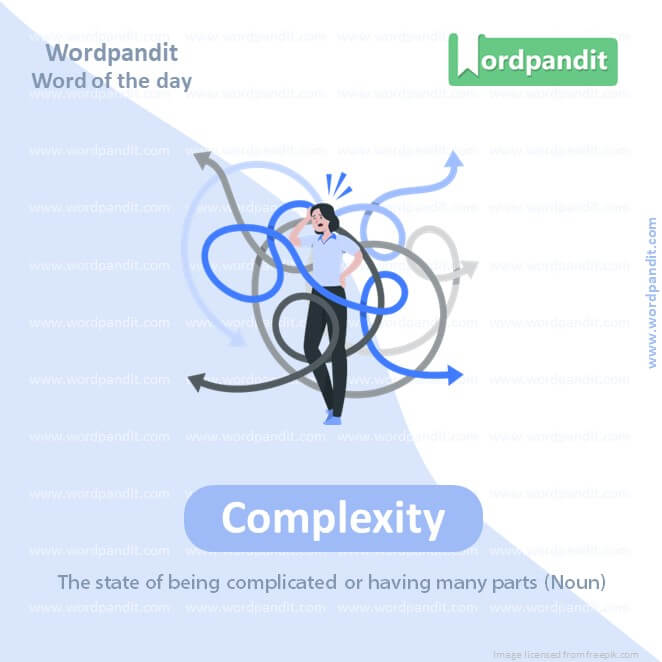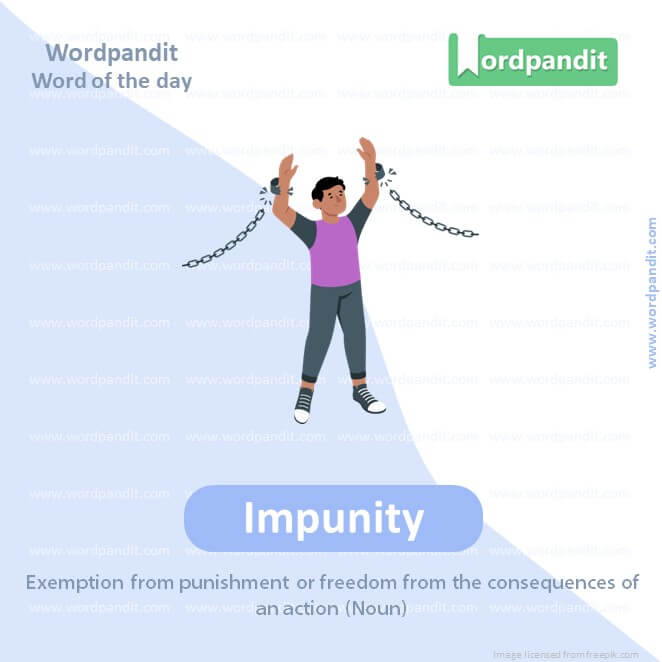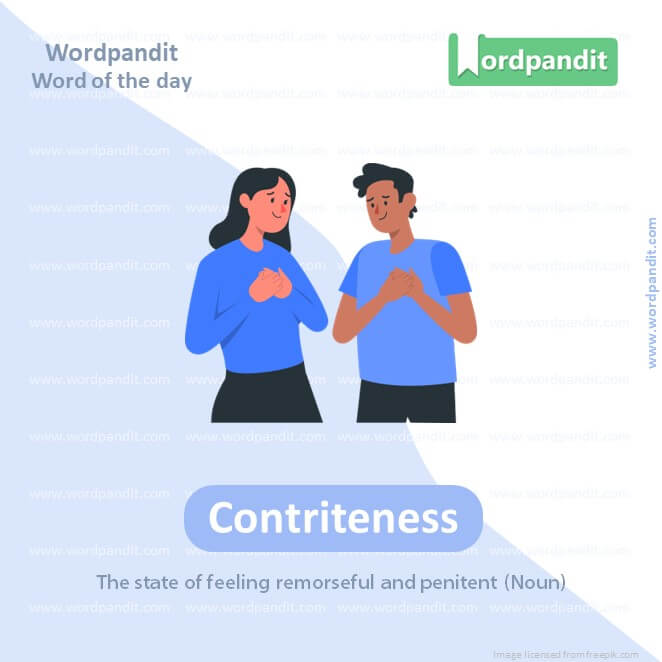Daily Vocabulary Words: List of Daily Used Words in Leading Indian Newspapers
Hi there. Welcome to this special section @ Wordpandit. Our endeavour here is straightforward: highlighting daily vocabulary words that you would come across in leading newspapers in the country. We have included the following newspapers in our selection:
• The Times of India
• The Economic Times
• Hindustan Times
• Mint
• Indian Express
We are putting in extensive work to develop your vocabulary. All you have to do is be regular with this section and check out this post daily. This is your repository of commonly used words; essentially, we are posting a list of daily used words. Hence, this has significant practical application as it teaches you words that are commonly used in leading publications mentioned above.
Visit the website daily to learn words from leading Indian newspapers.

WORD-1: Complexity
CONTEXT:That does not detract from the complexity of piracy or the reality that no theory fully captures its essence.
SOURCE: Indian express
Explanatory Paragraph: Complexity is when something is really complicated or has lots of parts that make it hard to understand. Like a big puzzle with many tiny pieces.
Meaning: The state of being complicated or having many parts (Noun).
Pronunciation: kuhm-PLEK-si-tee
Synonyms: Complication, Intricacy, Difficulty, Sophistication, Elaborateness.
Usage Examples:
1. The complexity of the machine made it hard to fix.
2. They discussed the complexity of the problem at the meeting.
3. The game’s complexity makes it challenging and fun.
4. Understanding the complexity of human emotions can be difficult.

WORD-2: Impunity
CONTEXT: The lessons of the Bilkis Bano case are that the dignity, liberty, privacy and human rights of citizens are violated with impunity.
SOURCE: Indian express
Explanatory Paragraph: Impunity is when someone does something wrong but doesn’t get in trouble for it. It’s like breaking a rule and not having to go to time-out.
Meaning: Exemption from punishment or freedom from the consequences of an action (Noun).
Pronunciation: im-PYOO-ni-tee
Synonyms: Immunity, Exemption, Freedom, License, Exoneration.
Usage Examples:
1. He stole the cookies with impunity, as no one saw him.
2. Corrupt leaders often act with impunity.
3. There should be no impunity for breaking the law.
4. The policy gave them a sense of impunity against minor offenses.

WORD-3: Bereaved
CONTEXT: None could have poured out the anguish of a human better than an abused, violated and bereaved mother by name Bilkis Bano.
SOURCE: Indian express
Explanatory Paragraph: Bereaved is when someone is very sad because a loved one, like a family member or a pet, has died. It’s feeling a big sadness because you miss them.
Meaning: Suffering the loss of a loved one (Adjective).
Pronunciation: buh-REEVD
Synonyms: Grieving, Mourning, Sorrowful, Heartbroken, Distressed.
Usage Examples:
1. The bereaved family received many messages of sympathy.
2. Support groups can help bereaved individuals.
3. She wrote a book about her experiences as a bereaved parent.
4. The ceremony paid tribute to the bereaved of the disaster.

WORD-4: Contriteness
CONTEXT: The released convicts did not show any contriteness; nor did they walk into the sunset.
SOURCE: Indian express
Explanatory Paragraph: Contriteness is feeling really sorry for something you did wrong. Like if you accidentally break a friend’s toy and feel bad about it.
Meaning: The state of feeling remorseful and penitent (Noun).
Pronunciation: KAHN-trite-ness
Synonyms: Remorse, Penitence, Regret, Repentance, Guilt.
Usage Examples:
1. His contriteness was evident in his apology.
2. She showed contriteness by trying to make things right.
3. The judge took his contriteness into account during sentencing.
4. There was a sense of contriteness in his voice.

WORD-5: Reverence
CONTEXT: They were welcomed and feted with garlands and sweets. Some in the welcoming party touched their feet, showing reverence.
SOURCE: Indian express
Explanatory Paragraph: Reverence is a feeling of deep respect for someone or something. It’s like looking up to your favorite superhero or loving a place because it’s very special and important.
Meaning: Deep respect and admiration for someone or something (Noun).
Pronunciation: REV-uh-rens
Synonyms: Respect, Admiration, Esteem, Veneration, Honor.
Usage Examples:
1. She spoke of her grandmother with great reverence.
2. The ancient temple is a place of reverence and worship.
3. His reverence for nature was reflected in his artwork.
4. The ceremony was conducted with solemn reverence.
WORD-6: Reprieve
CONTEXT: This column is not about the unjustified reprieve won by the convicts.
SOURCE: Indian express
Explanatory Paragraph: Reprieve is like getting a break from something difficult or unpleasant. Imagine you have to clean your room but then get extra time to play before you have to start cleaning.
Meaning: A temporary relief from something difficult or unpleasant (Noun).
Pronunciation: ree-PREEV
Synonyms: Relief, Respite, Break, Pardon, Suspension.
Usage Examples:
1. The rain gave a much-needed reprieve from the heatwave.
2. The prisoner was granted a reprieve from the penalty.
3. She sighed in reprieve when she found her lost keys.
4. The vacation was a welcome reprieve from work.
WORD-7: Euphemism
CONTEXT: How did this high command, which is a euphemism for the Gandhi family, spend two weeks mulling over the invitation they got and then arrive at a decision that harms the party more than anyone else.
SOURCE: Indian express
Explanatory Paragraph: A euphemism is a nicer or less direct way of saying something that might be unpleasant or embarrassing. Like saying ‘passed away’ instead of ‘died’.
Meaning: A mild or indirect word or expression used to replace one considered too harsh or blunt (Noun).
Pronunciation: YOO-fuh-miz-um
Synonyms: Softening, Understatement, Polite term, Mild expression, Indirect phrase.
Usage Examples:
1. “Let go” is a euphemism for being fired.
2. They used a euphemism to discuss the sensitive topic.
3. “Between jobs” is a euphemism for being unemployed.
4. He used a euphemism to avoid offending anyone.
WORD-8: Plausible
CONTEXT: A good reason but not plausible. It was Rajiv Gandhi who opened the locks to what was then the Babri Masjid and he organised his own consecration ceremony for a Ram Temple before the general election in 1989.
SOURCE: Indian express
Explanatory Paragraph: Plausible is when something sounds like it could be true or possible. It’s like telling a story that seems real enough that people might believe it.
Meaning: Seeming reasonable or probable (Adjective).
Pronunciation: PLAW-zuh-bul
Synonyms: Believable, Credible, Likely, Conceivable, Reasonable.
Usage Examples:
1. Her story sounded plausible to the listeners.
2. He gave a plausible explanation for being late.
3. The theory is plausible, but lacks evidence.
4. It’s plausible that she could have forgotten the appointment.
WORD-9: Consecration
CONTEXT: Pilgrims have started flocking to Ayodhya in such huge numbers that Modi has appealed for people to celebrate instead in their own homes on the day of the consecration.
SOURCE:Indian express
Explanatory Paragraph: Consecration is like making something very special, often for religious reasons. It’s like when a place or a thing is blessed to be important and sacred.
Meaning: The act of making something holy or sacred (Noun).
Pronunciation: kon-suh-KRAY-shun
Synonyms: Sanctification, Blessing, Dedication, Hallowing, Ordination.
Usage Examples:
1. The consecration of the new church was a solemn event.
2. Her life was devoted to the consecration of her faith.
3. The consecration ceremony was attended by many people.
4. Items used in the ritual underwent consecration. Explanatory Paragraph: Consecration is like making something very special, often for religious reasons. It’s like when a place or a thing is blessed to be important and sacred.
Meaning: The act of making something holy or sacred (Noun).
Pronunciation: kon-suh-KRAY-shun
Synonyms: Sanctification, Blessing, Dedication, Hallowing, Ordination.
Usage Examples:
1. The consecration of the new church was a solemn event.
2. Her life was devoted to the consecration of her faith.
3. The consecration ceremony was attended by many people.
4. Items used in the ritual underwent consecration.
WORD-10 Sickening
CONTEXT. we need the Congress Party to stop sulking and the BJP to put an end to the sickening triumphalism that its more hysterical cadres continue to exhibit.
SOURCE: Indian express
Explanatory Paragraph: Sickening is when something makes you feel really gross or unwell. It’s like when you see or smell something yucky and it makes your stomach feel bad.
Meaning: Causing or liable to cause a feeling of nausea or disgust (Adjective).
Pronunciation: SIK-uh-ning
Synonyms: Disgusting, Nauseating, Revolting, Repulsive, Distasteful.
Usage Examples:
1. The sight of the spoiled food was sickening.
2. She felt a sickening feeling as the roller coaster dropped.
3. The news of the tragedy had a sickening effect on the community.
4. He described the crime scene as sickening.
Vocabulary Words for IELTS'
Preparing for an esteemed examination like IELTS urges a diligent focus on ‘vocabulary words for IELTS’. These specific words, frequently prominent in IELTS examinations, play a vital role in expressing ideas effectively and articulately. To successfully conquer ‘vocabulary words for IELTS’, a strategic and focused approach is quintessential.
A fundamental step when learning ‘vocabulary words for IELTS’ is understanding these words in the context of use. For this, exposure to diverse resources like newspapers, journals, academic texts, and digital content is crucial. This engagement aids in understanding the nuances of these words, fortifying your preparation for ‘vocabulary words for IELTS’.
When tackling ‘vocabulary words for IELTS’, regular practice is the cornerstone of success. Consistent writing and speaking exercises help in embedding this vocabulary in your linguistic repertoire. Take situations or topics that commonly appear in the IELTS exam and practice crafting complex yet coherent sentences using these words.
In the journey to unfold ‘vocabulary words for IELTS’, making use of memory-enhancement techniques can orchestrate your success. Tools like flashcards and recall-based applications can significantly assist in retaining and reinforcing these words in your memory. Additionally, forming personal connections or stories with these words can greatly improve word recall.
Brevity is equally significant when preparing for ‘vocabulary words for IELTS’. Attempt to learn a limited number of words each day rather than tackling a large list all at once. This habit allows the brain adequate time to absorb and store these words securely, ensuring an effective learning experience.
In conclusion, the quest to master ‘vocabulary words for IELTS’ is an engaging dance of comprehension, practice, memory techniques, and thoughtful pacing. As you pirouette gracefully through these strategies, you’ll find communicating your IELTS responses with the right ‘vocabulary words for IELTS’ is less of a cliffhanger and more of an epic tale of language success.













